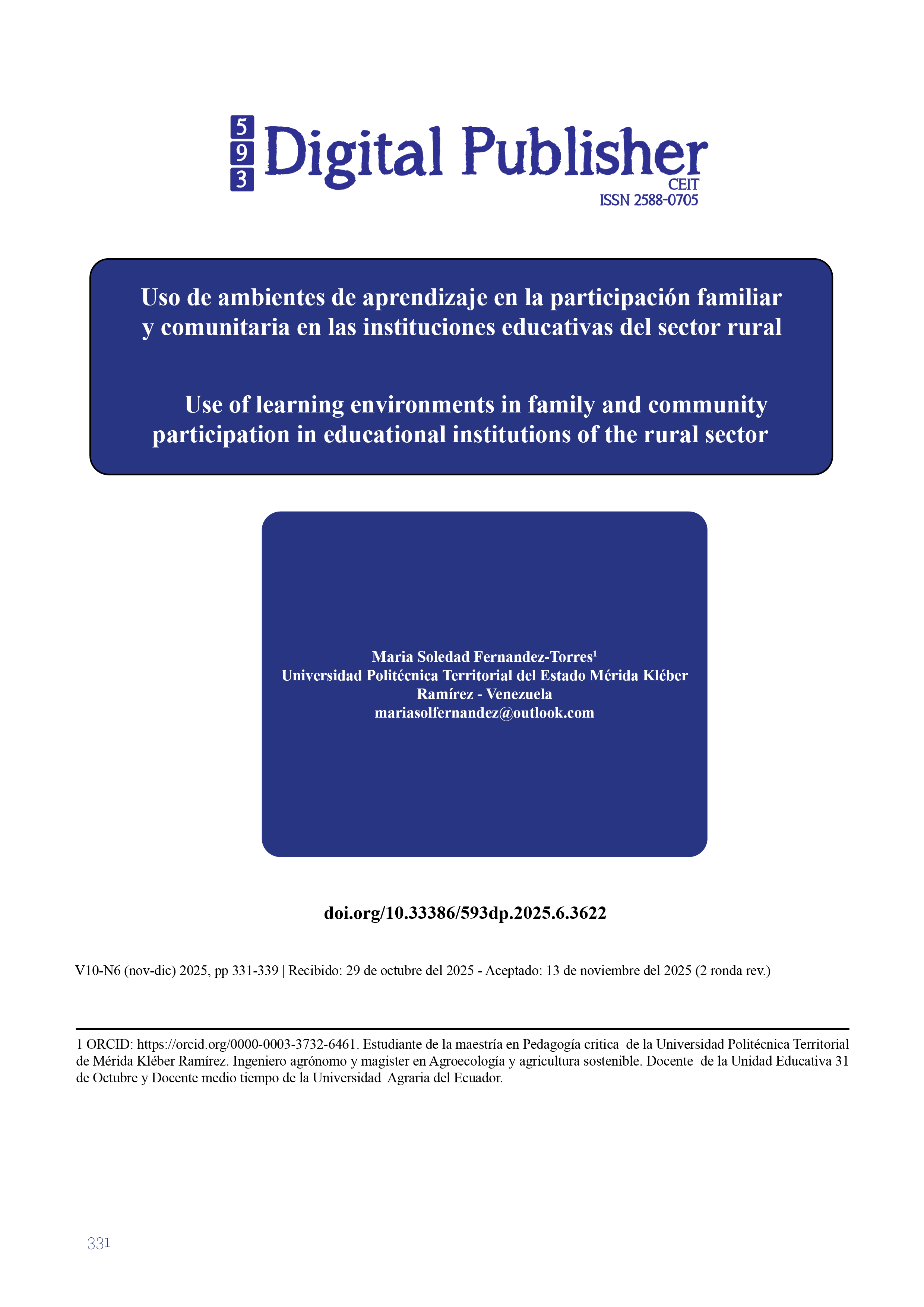Use of learning environments in family and community participation in educational institutions of the rural sector
Main Article Content
Abstract
This study examines the influence of family and community participation on the creation of participatory learning environments in rural basic education institutions in Ecuador. Its main objective was to understand how school–family–community interactions affect student motivation, academic achievement, and social cohesion. A qualitative, descriptive, and exploratory approach was applied, using semi-structured interviews, focus groups, participant observation, and document analysis at the “Ejército Ecuatoriano” Basic Education School. Data were analyzed through thematic analysis (Braun & Clarke, 2022), ensuring rigor via triangulation and participant validation.
Findings indicate that sustained family involvement and community collaboration strengthen institutional identity and foster meaningful learning experiences; nonetheless, structural barriers—such as limited time, weak digital connectivity, and insufficient teacher training in participatory management—persist. It is concluded that pedagogical leadership and the incorporation of local knowledge are essential to develop inclusive and culturally relevant learning environments. This research provides practical implications for rural teacher training, community-based school management, and public policies promoting educational equity and social inclusion.
Downloads
Article Details

This work is licensed under a Creative Commons Attribution-NonCommercial-ShareAlike 4.0 International License.
1. Derechos de autor
Las obras que se publican en 593 Digital Publisher CEIT están sujetas a los siguientes términos:
1.1. 593 Digital Publisher CEIT, conserva los derechos patrimoniales (copyright) de las obras publicadas, favorece y permite la reutilización de las mismas bajo la licencia Licencia Creative Commons 4.0 de Reconocimiento-NoComercial-CompartirIgual 4.0, por lo cual se pueden copiar, usar, difundir, transmitir y exponer públicamente, siempre que:
1.1.a. Se cite la autoría y fuente original de su publicación (revista, editorial, URL).
1.1.b. No se usen para fines comerciales u onerosos.
1.1.c. Se mencione la existencia y especificaciones de esta licencia de uso.
References
Ayre, M., Smith, J., Patel, R., & Zhao, T. (2022). Qualitative rigor in community-based educational research. Educational Review, 74(6), 1123–1140. https://doi.org/10.1080/00131911.2022.2024567
Braun, V., & Clarke, V. (2022). Thematic analysis: A practical guide for researchers. Qualitative Research in Psychology, 19(3), 438–460. https://doi.org/10.1080/14780887.2020.1769238
Broom, L., & Leggett, P. (2022). Family engagement and student motivation in low-resource schools. Education and Urban Society, 54(8), 1012–1031. https://doi.org/10.1177/00131245211068241
CEPAL-UNESCO. (2022). Educación rural y equidad social en América Latina: Desafíos y perspectivas. Comisión Económica para América Latina y el Caribe (CEPAL). https://repositorio.cepal.org
García, R., Torres, A., & Molina, F. (2023). Community-based learning and rural development in Latin America. International Review of Education, 69(4), 521–540. https://doi.org/10.1007/s11159-023-10010-7
Greenland, S. (2022). Educational inquiry and interpretive design in complex contexts. International Journal of Educational Research Open, 15, 100214. https://doi.org/10.1016/j.ijedro.2022.100214
Gu, S., Li, Z., & Chen, L. (2024). Parental involvement and academic achievement in rural primary schools: A multilevel analysis. Children and Youth Services Review, 158, 107234. https://doi.org/10.1016/j.childyouth.2024.107234
Kumar, D., Al-Zoubi, S., & Torres, P. (2024). Community participation and educational quality in rural schools: Evidence from developing contexts. Educational Studies, 60(2), 187–205. https://doi.org/10.1080/03055698.2023.2211452
Manrique, V., Paredes, M., & Silva, L. (2023). La corresponsabilidad familiar y su incidencia en el rendimiento escolar rural. Revista Latinoamericana de Educación Inclusiva, 17(2), 45–64. https://doi.org/10.4067/S0718-73782023000200045
Maruyama, K., Rivera, J., & Darder, A. (2023). Culturally responsive pedagogy and participatory learning environments. Learning, Culture and Social Interaction, 38, 100669. https://doi.org/10.1016/j.lcsi.2023.100669
Morowane, T. (2024). Socio-economic determinants of parental involvement in education. International Journal of Educational Research Open, 16, 100225. https://doi.org/10.1016/j.ijedro.2024.100225
Nowell, L., Norris, J., White, D., & Moules, N. (2024). Thematic analysis: Advancing trustworthiness in qualitative studies. International Journal of Qualitative Methods, 23, 16094069231108224. https://doi.org/10.1177/16094069231108224
Rivera, A. (2022). Gestión escolar y participación comunitaria en contextos rurales de América Latina. Revista Educación y Desarrollo Social, 16(3), 55–74. https://doi.org/10.18359/reds.6105
Ssekamwa, J. (2021). Teacher motivation and community participation in rural schooling. Compare: A Journal of Comparative and International Education, 51(6), 823–840. https://doi.org/10.1080/03057925.2020.1824507
Tălmăcean, G. (2022). Collaborative classrooms and learner autonomy in rural education. International Journal of Educational Development, 91, 102578. https://doi.org/10.1016/j.ijedudev.2022.102578
Tenny, S., & Brannan, G. (2022). Exploring qualitative inquiry in educational contexts. Education and Urban Society, 54(8), 987–1002. https://doi.org/10.1177/00131245211068125
American Educational Research Association (AERA). (2023). Ethical standards for educational research. American Educational Research Association.


